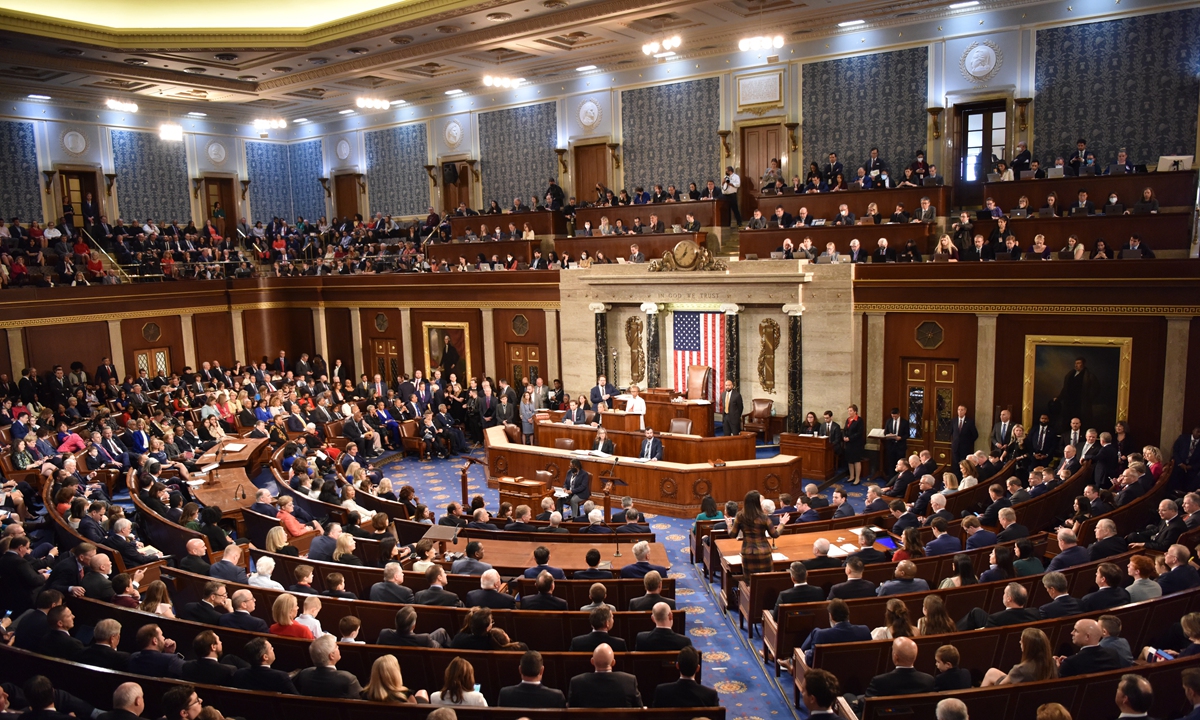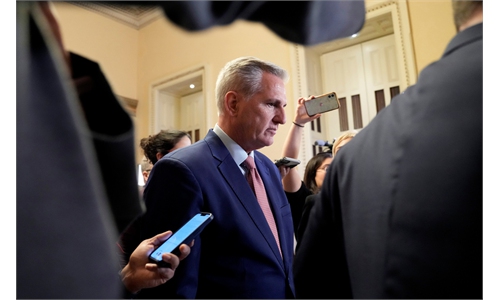Weighed down by political chaos at home, US to reopen embassy in Solomons, revealing desperate attempt to maintain hegemony

Republican Kevin McCarthy fails to win the 218 votes required to become speaker on January 3, 2023, after three rounds of voting in the US House of Representatives. Photo: VCG
Despite being mired in political chaos at home, the Biden administration still desperately wants to maintain its hegemony and assertiveness abroad through its latest move of looking to reopen the US embassy in the Solomon Islands, which experts believed aims to contain China's influence in the Pacific.
The US State Department has informed Congress that it will soon establish an interim embassy in the Solomon islands' capital of Honiara on the site of a former US consular property. It said the modest embassy will initially be staffed by two American diplomats and five local employees at a cost of $1.8 million per year. A more permanent facility with larger staffing is eventually envisioned, it said, the AP reported.
The report noted that the US closed its embassy in Honiara in 1993 "as part of a post-Cold War global reduction in diplomatic posts and priorities."
After the Cold War, Washington viewed the South Pacific region as being less important, so it reduced its aid and presence in the region, which included closing the US Embassy in Solomon Islands in 1993, Chen Hong, president of the Chinese Association of Australian Studies and director of the Australian Studies Centre at East China Normal University, told the Global Times on Thursday.
However, since the Solomons signed a security pact with China in April 2022 and the two sides have maintained mutually beneficial cooperation, the US has hardly sat still, sending several high-level delegations to the islands that year.
For example, in August 2022, the US again sent a high-profile diplomatic delegation led by Deputy Secretary of State Wendy Sherman and Ambassador Caroline Kennedy. As repeatedly mentioned by Washington, the trip also highlighted the reopening of the US embassy in Honiara, which is part of the US strategy to counter China's growing influence.
Chen pointed out that in fact, US consular services in the Solomon Islands are limited, and the move to reopen the embassy is aimed at strengthening its presence influence in the Pacific. Its strategic significance is far greater than its practical significance, as the US' ultimate purpose is to use the region "as a bridgehead to counter and suppress China," Chen said.
According to the AP report, the US State Department said in a notice to Congress dated December 23 that "The United States needs a permanent diplomatic presence in Honiara to effectively provide a counterweight to growing (Chinese) influence and deepen our engagement with the region commensurate with its importance."
However, its attention to the island nation as well as the South Pacific region comes too late and only shows hypocrisy, observers said.
China and South Pacific regions have maintained good cooperation as China brings "tangible benefits" to local people, such as building roads, ports, airports and schools, which are welcomed by local people, Chen said.
However, the US and its ally Australia have always tried to transplant their own values and ideology to the region without caring about whether the locals want it, according to Chen. The US only uses the region for its own strategic purposes, including conducting nuclear weapons tests, the observer noted.
As it moves to enhance ties with the Solomon Islands, the US is also seeking to shore up relations with other Pacific nations that it fears may also be drawn into China's orbit, media reported.
With its intensive attempts of "coming back to the region" while smearing China's cooperation with the region and hyping the so-called China threat, it is obvious that the US wants to build an exclusive clique in the region to help realize its hegemonic position, said Chen.
The people of the Solomon Islands have also expressed opposition to the intentions of major powers to drag the region into a battlefield of strategic competition on social media and other platforms. Can the US heed such voices and listen to the calls?
The US closed its embassy in the Solomon Islands in 1993 — one example of its neglect of the region in recent decades — whereas China has increased its influence and footstep in the areas of development, especially in the field of infrastructure, which island countries need the most. Plans to reopen an embassy in the Solomon Islands and invite Pacific leaders to Washington may be a good start, but are not enough.
However, the US is apparently weighed under by domestic issues. On Tuesday, the US House of Representatives went through a "difficult labor" of electing a new speaker after three rounds of voting failed to yield any result. The last time a House speaker vote went to multiple ballots was 100 years ago.
Chinese observers warned that it is a drama that has been repeated and intensified in recent years in US politics: the more intense the battle between the two main parties, the more the "China threat" becomes a topic of discussion.


